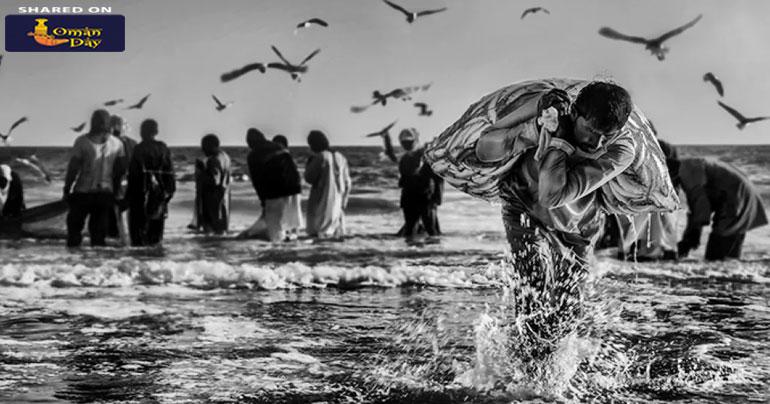Call for stricter laws against illegal fishing in Oman
A total of 2,857 cases of violation of traditional fishing laws were registered in the Sultanate in 2017, compared with 1,931 cases in 2016. This number is only rising, according to the Ministry of Agriculture and Fisheries.
“Marine organisms are the country’s wealth. Fishermen are the first beneficiaries of this wealth, so preserving the safety of marine life in Oman is the duty of citizens, not just the government,” said Salman Al Subhi, Director of fisheries surveillance and licencing department.
Fishing nets are an example of equipment that harms the marine environment. One net has the capacity to capture 50-80 per cent of untargeted fish, such as turtles, sharks, and other species (not during the fishing season).
“The number of violations is increasing, and we need strict laws to deter violators. Cases are often referred to courts, which reduce the sentence to take into account the social conditions of the violator and do not rule that this crime is ruining the wealth of a country. The sentences are usually not deterrents and an offender often commits the same offence again,” Al Subhi added. According to statistics, most of the violators are concentrated in the governorates of Al Batinah, Al Wusta, and Dhofar. “The reason for the concentration of violations in these governorates is because of the presence of a large number of fishermen in Al Batinah, and because of vital fishing areas, which are concentrated in Al Wusta and Dhofar,” Al Subhi explained.
Tracking violations is in accordance with the law of marine fishing, which specifies fishing equipment, fishing seasons and licences for fishing activity. According to law, small boats are not allowed to be used by expats for fishing, only local fisherman can fish in them and expats can only work onboard the ships.
“Artisanal fishing faces the biggest challenge because of the presence of unregistered fishermen and illegal migrant workers. Unfortunately, there is the complicity of citizens who are not committed to the laws of fishing and labour laws and employ illegal expats for fishing,” said Al Subhi. Illegal fishing and unlicenced expatriate workers have a lot of negative impacts on social security, the economy, and marine ecology, according to officials at the Ministry of Agriculture and Fisheries.
Al Subhi noted: “The concentration of illegal expats in a specific area has a negative effect on the society, including the security aspect. Most of the time, a large number of migrant workers live in certain areas near the coast, exceeding the number of citizens living in the area. This affects the safety and security of citizens in that area. And most of these workers are illegal. Even if someone commits a crime, the authority cannot easily arrest offenders because they are not registered in the country and because they have entered illegally or their sponsor is unknown.”
“The most important issue is the negative impact on the marine environment and its sustainability. Expatriates think only about profit, so they practice fishing at unauthorised or off-season sites and at the time of fish breeding. The income goes to expatriates and not citizens,” he added.
Al Subhi further added: “Unfortunately, these workers work in unlicenced boats, and licences are also one of the country’s income sources. In addition, when they carry out any illegal activity, it is not possible to identify the boat because it does not have any data or a registered number.”
The use of prohibited equipment causes pollution of the environment, in addition to affecting the country’s fish stocks. This is the most important point that the ministry seeks to reduce and eliminate.
“Last week, we carried out a campaign in the Shweimiyah area and managed to arrest more than 134 expatriate workers. The activity on the coast of the Sultanate affects the marine environment, including the use of unlicenced fishing nets. The ministry issued a number of laws and granted fishermen the opportunity to obtain permits. After the period, we started watching the violators closely to eliminate unauthorised persons and those who use unlicenced equipment,” Al Subhi said.
The supervisory staff of the ministry is close to 55 observers along the coast of Oman and because of the diversity of terrain in the Sultanate, sometimes, violators can escape before observers arrive at the location.
“Unfortunately, these illegal practices are carried out in informal times. They know the observers are on official holidays. Sometimes, observers inform violators that the control team is on its way. At other times, we get false reports and the violators flee elsewhere and the team control efforts are in vain,” Al Subhi said.
“Nevertheless, we are in constant cooperation with the Ministry of Manpower and the coastguard police to increase our supervisory efforts,” Al Subhi added.
“A month ago, the court issued judgments in Dhofar against violators, amounting to OMR6,000. That decision created an impact on the society and people realised the importance of the ocean. We need advanced equipment to assist in monitoring and tracking violators. We had a tracking system for large ships, but most irregularities are in artisanal fishing vessels, so they have to be tracked,” he further said.
Share This Post






